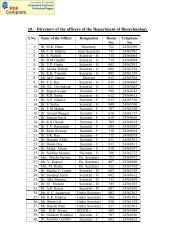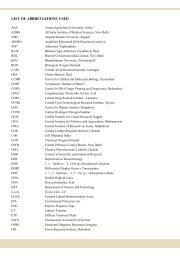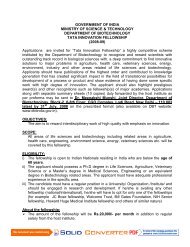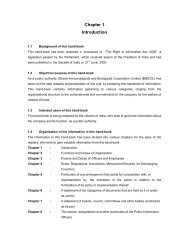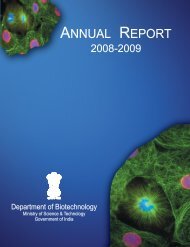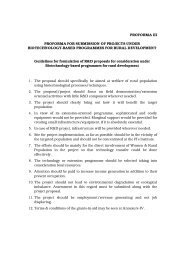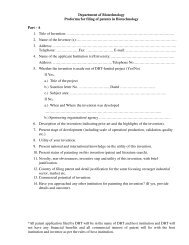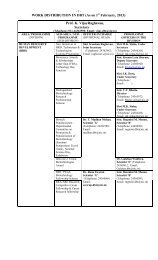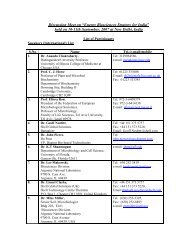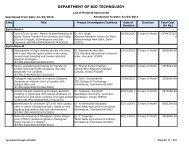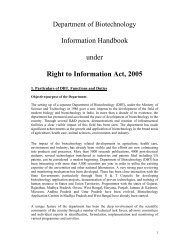ANNUAL REPORT - Department of Biotechnology
ANNUAL REPORT - Department of Biotechnology
ANNUAL REPORT - Department of Biotechnology
You also want an ePaper? Increase the reach of your titles
YUMPU automatically turns print PDFs into web optimized ePapers that Google loves.
section in the Western Dun Valley to benefit around<br />
234 people from 18 villages <strong>of</strong> Sahaspur Block <strong>of</strong><br />
DehraDun. A commercial spawn production unit was<br />
established and marketing linkages were<br />
established. Doon Valley Mushroom Cooperative is<br />
helping the beneficiaries in marketing the produce in<br />
the local market. The beneficiaries are earning a<br />
good income through sale <strong>of</strong> their produce in addition<br />
to consumption in their daily meals to improve their<br />
nutritional status.<br />
Medicinal Plants and Plantation Crops<br />
Aspects on biodiversity conservation were pursued<br />
to improve the livelihood <strong>of</strong> communities dependent<br />
on forests. High yielding varieties viz. large<br />
cardamom, black pepper, ginger were introducted for<br />
farmers and cultivation was promoted in Trichy<br />
district. Self-help groups were established for<br />
successfully producing and selling the compost.<br />
Farmers were trained on scientific cultivation <strong>of</strong><br />
medicinal plants, organic farming, water<br />
management techniques & marketing strategies.<br />
Farmers realized lucrative income through<br />
cultivation <strong>of</strong> medicinal plants as compared to<br />
conventional cash crops. Sensitization programme<br />
was undertaken for SHGs to introduce non-timber<br />
forest produce collectors and herbal healers at<br />
Tirupati District, Andhra Pradesh. Model for<br />
development <strong>of</strong> herbal medicines and its cultivation<br />
in kitchen gardens were demonstrated to identified<br />
SHGs. Training programmes were conducted on<br />
herbal medicine preparation, nutritive foods,<br />
sustainable harvesting techniques and cultivation <strong>of</strong><br />
MAPs. Model manufacturing units are being<br />
established for manufacturing licensed medicines<br />
through tribal involvement. Integrated horti-forest<br />
herb cultivation was undertaken in Nagalnd and<br />
Manipur through transfer <strong>of</strong> technology on cultivation<br />
<strong>of</strong> citronella, lemongrass, patchouli, bamboo and<br />
mushroom to benefit around 250 people.<br />
Demonstration units on essential oil, bamboo and<br />
mushroom cultivation were established.<br />
Identification <strong>of</strong> superior germ plasm and selection <strong>of</strong><br />
plus trees after extensive survey in different parts <strong>of</strong><br />
Madhya Pradesh was undertaken. Trees <strong>of</strong> Aonla,<br />
Achar, Harra, Baheda and Mahua are being used far<br />
clonal propagation. Seedlings <strong>of</strong> these species have<br />
been produced and budding were successfully<br />
carried out. Flowering and fruiting in Mahua was<br />
Herbal plantation production through nursery<br />
achieved in one year old clonal plants through clonal<br />
propagation technique. Successful epicotyls grafting<br />
in Mohua was achieved. Training programmes on<br />
activation <strong>of</strong> bud material and collection <strong>of</strong> activated<br />
bud were imparted to the villagers. The knowledge <strong>of</strong><br />
aftercare <strong>of</strong> clonal plants was also given to them<br />
through field trainings. Around 6000 clonal plants<br />
were distributed to 218 tribal beneficiaries.<br />
Programmes for Women<br />
During the year, 186 new proposals received (April-<br />
November). Out <strong>of</strong> these, 20 were supported after<br />
their evaluation through three tier system. The Task<br />
Force reviewed 62 completed as well as ongoing<br />
projects. Over 16,000 women benefited though these<br />
projects under three major categories viz. (i)<br />
economic empowerment using s<strong>of</strong>ter<br />
biotechnologies, (ii) awareness on nutrition and<br />
health including importance <strong>of</strong> traditional<br />
food/healthcare and (iii) technical empowerment<br />
including capacity building, developing training<br />
modules etc. Over 8,000 women were benefited<br />
directly through biotech packages for floriculture,<br />
horticulture, cultivation <strong>of</strong> mushrooms, medicinal and<br />
aromatic plants, bi<strong>of</strong>ertilisers, organic farming,<br />
vermicomposting, sericulture, bee keeping,<br />
aquaculture, animal husbandry, poultry farming and<br />
value added food items. Approximately similar<br />
numbers benefited indirectly through programmes<br />
for human health and awareness generation.<br />
Highlights <strong>of</strong> the projects are given below :<br />
Medicinal and Aromatic Plants<br />
Approximately 800 women from J&K, Uttaranchal,<br />
135 <strong>Biotechnology</strong> for Societal Development



